This article has all the basic growing and planting information that is going to help you with How to Grow a Cashew Tree!
Cashew nuts are easy to grow, but they require a more specific environment and growing conditions. If you can provide that environment, you can plant a cashew tree and enjoy the nuts and fresh fruits that are known as cashew apples.
Botanical Name: Anacardium occidentale
USDA Zones — 10 – 11
Other names — Maranon, Noix d’anacarde, Caju, Kaju, Mundiri, Kazu, Pajuil, Paringi mavu
Cashew Nuts Tree Growing Information
Cashew originates from the Caribbean Islands and the North East of Brazil. But today it is grown in several other tropical parts of the world, mostly in Africa, India, and Southeast Asia. Cashew trees can grow up to 6-12 meters (20-40 feet) high. Its evergreen leaves are oval, leathery, and dark green.
As for the fruits of this tree, do not be fooled by appearances. The cashew apple is oval-shaped like a bell pepper–yellow, orange, or red in color is a false fruit (it is also edible). The real fruit, more discreet, is a nut attached to the end of the fake fruit. It is that which contains the edible kernel, which we call Cashew.
How to Grow a Cashew Tree from Seeds?
Cashew trees can be grown from seeds, air layering, and grafting.
To propagate it from seeds, you will need a matured unshelled nut (seed). These seeds are viable for up to 4 months. If you have collected the fresh seed from the tree, dry it in the sun for 3 days and soak it in water overnight before sowing. Sow the seeds in a good quality seed starting mix; the seeds will germinate anywhere from 4 days to 3 weeks.
Can You Grow Cashew Trees in Pots?
Yes, it is possible to grow a cashew nut tree in a pot. To do so, buy a well-grafted tree from a nearby nursery and plant it in a medium pot. Once it outgrows the current pot in a few years, transfer it into one or two sizes bigger pots.
Requirements for Growing Cashew Nuts Tree 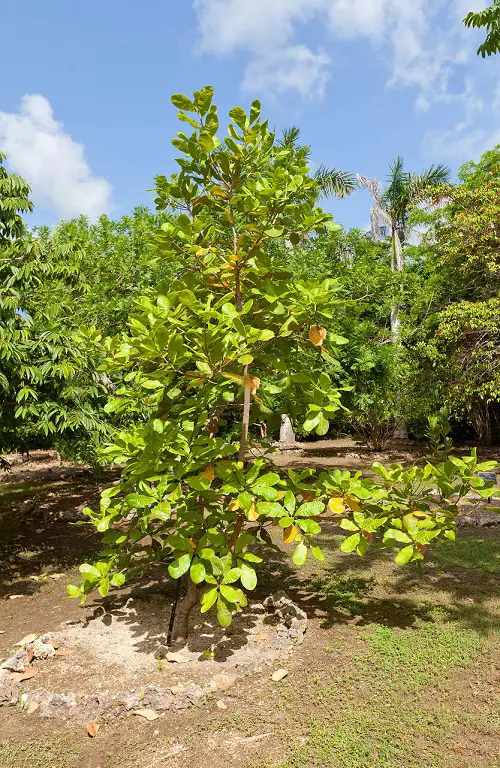
Position
Native to tropical regions, Cashew trees appreciate warm and humid climates. Ensure the tree receives a minimum of 6 hours of direct sunlight daily. Exposure to extended shade will inhibit fruit production and encourage pest infestation.
Soil
Cashew prefers a slightly acidic, well-draining, loamy growing medium with a pH of 5.5 to 7. Never grow cashew trees in clay-rich soil, as it does not appreciate waterlogging at all. If growing in a container, ensure the medium is amended with plenty of perlite, vermiculite, sand, or birch chips to aid drainage.
Water
Once established, cashew trees are moderately drought tolerant, but they produce more fruits if watered regularly. During the summer, water weekly or twice and deeply. Reduce or withhold watering during winter.
Overwatering can harm or even kill your cashew tree, so water only if the soil is dry and let the soil dry out between waterings.
Fertilizer
If growing a cashew tree in a pot, it needs regular fertilizer application to thrive and produce fruits. Use a 10:5:5 blend for healthy plant growth. Alternatively, you can use a balanced liquid fertilizer every 4-5 weeks after diluting it to half its strength.
Use slow-release fertilizer with N-P-K 8-3-9, according to the product instructions given on the packet, around the base of the tree every two to three months during the growing season. Also, apply compost or farm manure once a year, around 30 pounds (15 kg), on the surface of the soil around the base of a mature tree.
Cashew Tree Care
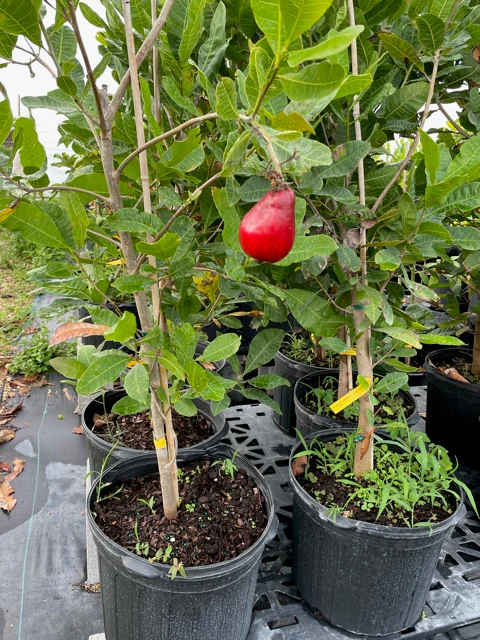
Pruning
Prune cashew trees regularly to remove weak, dead, and entangled branches and those infested with diseases or pests. Cut overcrowded branches to promote vigorous growth.
If you wish to create a canopy of a cashew tree, it is important to train it from a younger stage.
Mulching
Do mulching around your cashew tree with organic matter to prevent weeds and conserve moisture.
Pests and Diseases
If the cashew tree is in good health, it is generally pest-free. Major pests that pose a serious threat include the tea mosquito, stem and root borer, leaf Miner, and blossom Webber.
Keep a close eye on the leaves and blossoms, and take the necessary steps quickly when you spot pests or diseases.
Harvesting and Cashew Nut Processing
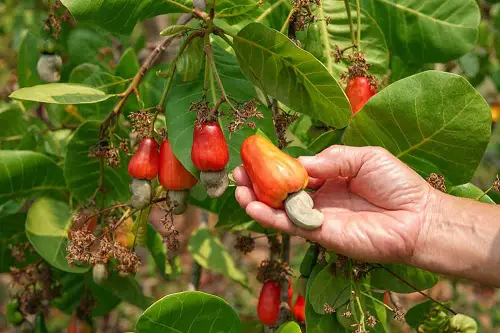
Harvest when cashew apples turn pink or red and nut shells are gray. After harvesting, separate the cashew apple from the nut.
Cashew apples can be eaten raw or used to make juice. Unshelled cashew nuts can be stored for up to 2 years. Do not attempt to break the shell before roasting; the shell contains very caustic oil that can burn skin.
When processing cashew nuts at home, you must wear gloves and safety glasses.
Cashew Nuts Growing Tips
- Sow fresh cashew seeds for germination, as they germinate easily.
- A tree grown from seeds takes 3 to 5 years to produce its first fruits. It is recommended to buy a potted plant from a nursery.
- Choose a location that is well protected from the wind.
- Cashew grows better when the temperature remains around 80 degrees Fahrenheit (25 C). However, they can withstand temperatures as low as 50 degrees Fahrenheit (10 C) and as high as 105 Fahrenheit (40.5 C) without any problem.
- Keep the area around the base of your cashew tree free from weeds, small shrubs, vines, and debris.
- Watch for dead branches and prune them if necessary.
Benefits of Cashew Nuts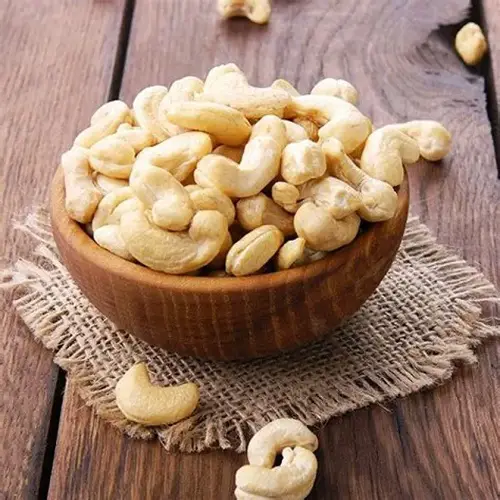
Cashews are the most delicious and healthiest nuts and an amazing source of nutrients. Not only the cashew nuts but their fruit are nutritious, too. This nut offers several medicinal benefits, it is a rich source of vitamin C, five times more than an orange. It also contains higher amounts of calcium, iron, and vitamin B1, which is more than most fruits.


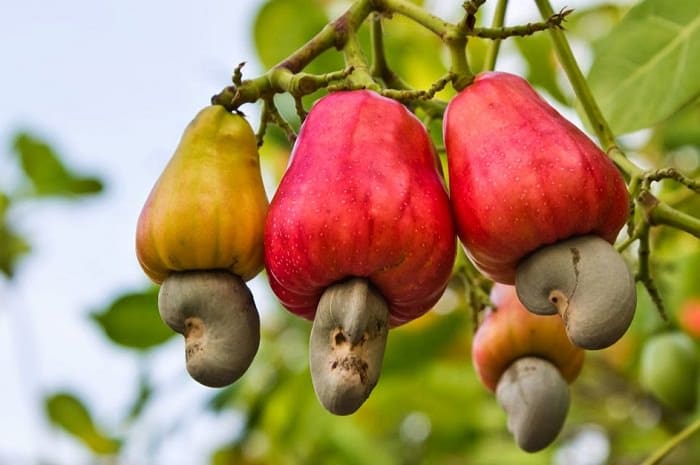

where can I buy small cashew trees in Northern California (the San Francisco area)
California can be tricky; they don’t like having plants shipped to them (historically, due to invasive species).
I would suggest asking around your local plant nurseries and putting in requests where possible. I hope you find one and enjoy your experience with growing your garden.
Good info about cashew nuts growing. What distance to grow between tree to tree?
As a rule, give at least 2.5 to 4 meters in space for roots of large trees. If unsure of where to plant, start in pots. Make sure to keep them 2.5 to 4 meters from the foundation of your home so the roots don’t hurt your house. I hope this helps. Happy gardening!
I would like to know the distance between tree to tree while planting. Can you please let me know this info?
you can use 9m by 9m
please let me know the distance between tree to tree while cultivating..
From where you can get the cashews seeds
where can I get or order cashew plants
Depending on your state, it can be extremely difficult for shipping. I’d try to find seeds or a start from a local nursery. Happy gardening!
Maybe from Vietnam
ISNT THE CASHEW NUT POISONOUS UNTIL IT IS PROCESSED?
Read the article!
I would like to know could you grow a cashew tree in a pot
I am planting it now with my group (help our Home organization) in Sierra Leone so how long will it take to providing fruit,
The article said 2 to 3 years.
I love farming presently I,m planting cashew nut
Is there only 1 nut on each cashew apple???
Am planning on having a bee garden and I want to add cashew trees into the garden. But I need to know how many times cashew produces it fruit in a year?
Is it a temperate,Tropical or sub tropical climate fruit, please know me.
and which country is the rich producer of this, if possible please know me about its internationally export and import.
I found this article very informative and useful. I have been growing Cashew in Sri Lanka for a very long time but I learnt something new reading this. I’m planning to grow Cashew more systematically now on my land in Koralegama in the Kurunegala District in the Dry Zone where Cashew grows well. Last year I planted some bud grafted plants and surprised to find the plants flowering now.
The article is very informative
Where can I get the seeds to grow into trees?
Google can provide a good answer to that.
Where can I buy small cashew trees and star apple? I’m from Southern California. Also can the trees be planted in a pot.
Thanks for this beautiful information . How long should the seedling remain on nursery ?
I agree with you
How long does it take to invest from your cashew tree
Why no mention of mango varieties grown in SA.
Cashew net fruit raw material varrite and rate
It has been 4 years now. Would love to hear an update on your trees.
How do you go about removing the toxins from the cashew nut before it is ready to be eaten?
Read the article well or go online to youtube..
If you want to import, I can deliver to you no matter the quantity
+233246131916